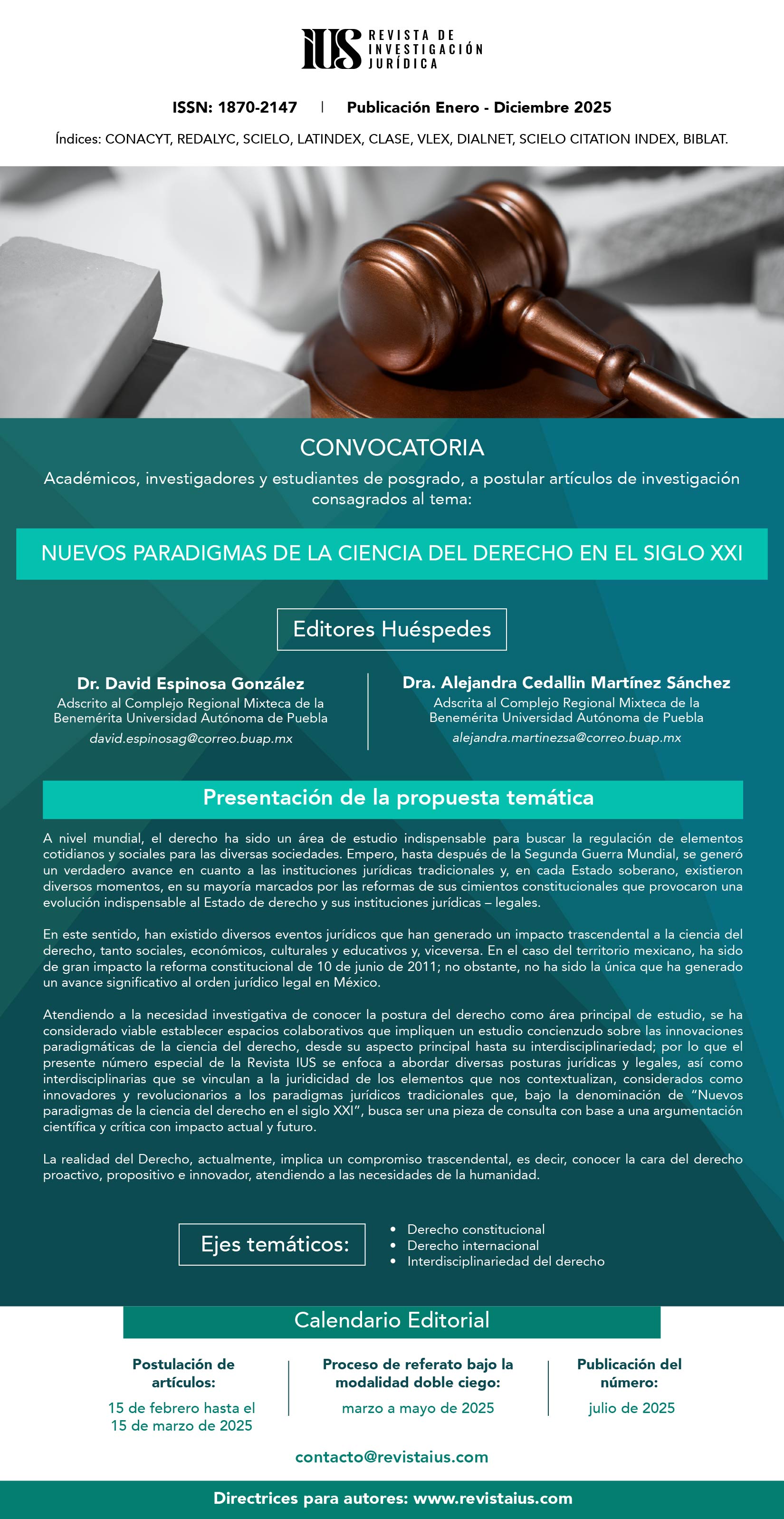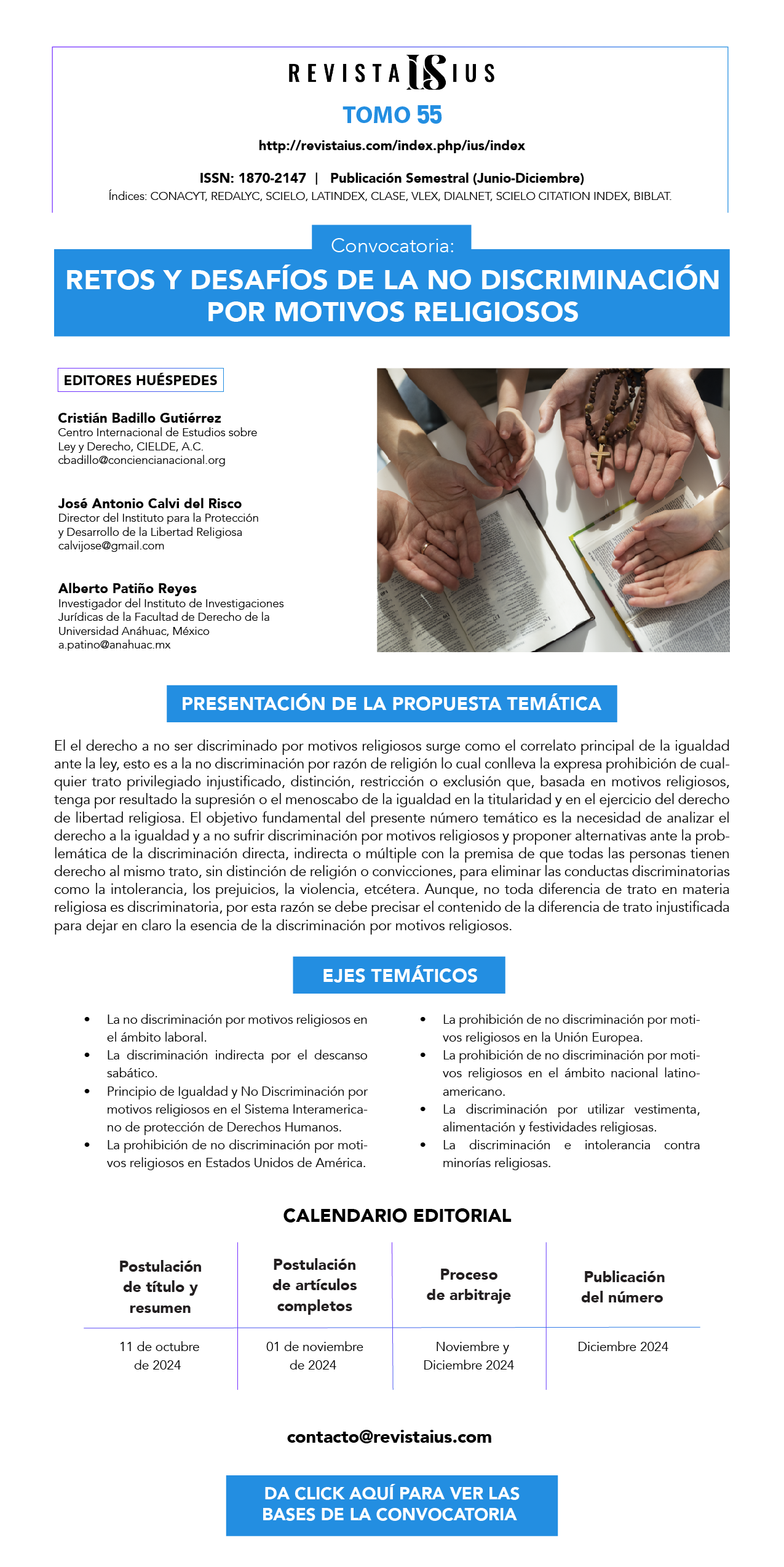Foreign policy and human rights in Mexico: trends at the end of the twentieth century and priorities at the beginning of the twenty-first
DOI:
https://doi.org/10.35487/rius.v11i40.2017.340Keywords:
Human rights, foreign policy, Mexico, international system, democracy .Abstract
The central target of this article is to identify the causes that led Mexico to including the topic of human rights as a significant point in its foreign policy agenda. The main argument is that this decision was due to the mix of xternal and internal factors that took place at the end of the twentieth century. The work is divided into four parts. The first one raises the link between foreign policy and human rights from a conceptual perspective. The second one explains external factors that motivated Mexico to project a different foreign policy on the field of human rights at the end of the twentieth century. The third one analyzes internal elements that influenced. The last part analyzes some specific cases on the link between foreign policy and human rights in the Mexican case.
Downloads
References
Anaya, Alejandro, “Libre comercio y política exterior en materia de derechos humanos en América del Norte. Una evaluación de la tesis del derrame (spillover)”, Espiral, Estudios sobre Estado y Sociedad, vol. 16, núm. 46, 2009.
Anaya, Alejandro, “Actors and Processes in the Generation of Change in the Human Rights Policy of Mexico”, en Mónica Serrano, Vesselin Popovski y Nicholas Turner (eds.), Human Rights Regimes in the Americas, Tokyo, United Nations University Press, 2010.
Anaya, Alejandro, El país bajo presión: debatiendo el papel del escrutinio internacional de derechos humanos sobre México, México, cide, 2014.
Casla, Koldo, “El papel de los derechos humanos en la política exterior de y en la Unión Europea: un modelo de análisis”, Relaciones Internacionales, núm. 17, 2011.
Chabat, Jorge, “La Iniciativa Mérida y la relación México-Estados. Unidos: en busca de la confianza perdida”, en Rafael Velázquez y Juan Pablo Prado (coords.), La Iniciativa Mérida: ¿Nuevo paradigma de cooperación entre México y Estados Unidos en seguridad?, México, unam - buap, 2009.
Covarrubias, Ana y Natalia Saltalamacchia, Los derechos humanos y la política exterior de los países de América Latina, México, itam - Porrúa, 2011.
“Condiciona EU fondos para Iniciativa Mérida”, El Universal, 18 de mayo, 2008.
Negrín, Alejandro, “Una política exterior de derechos humanos para la democracia”, El Cotidiano, núm. 150, 2008.
Ojeda, Mario, “Vicente Fox: El rompimiento de facto con Cuba”, Foro Internacional, vol. 47, núm. 4, 2007.
Pascoe, Ricardo, En el filo. Historia de una crisis diplomática. Cuba 2001-2002, México, Ediciones Sin Nombre, 2004.
Petrich, Blanche, “Orilló Fox a Castro a dejar la cumbre; Bush llegó más tarde”, La Jornada, 22 de marzo, 2002.
Saltalamacchia, Natalia y Covarrubias, Ana, “La dimensión internacional de la reforma de derechos humanos: antecedentes históricos”, en Miguel Carbonell y Pedro Salazar (coords.), La reforma constitucional de derechos humanos: un nuevo paradigma, México, unam, 2011.
Velázquez, Rafael, “El proyecto de política exterior de Vicente Fox: ¿Continuidad o cambio?”, en Rafael Velázquez (coord.), La política exterior de México bajo un régimen democrático ¿Cambio o continuidad?, México, Plaza y Valdés, 2002.
Downloads
Published
Issue
Section
License
Revista IUS, published by the Legal Sciences Institute of Puebla A.C., is distributed under the Creative Commons Attribution-NonCommercial 4.0 International (CC BY-NC 4.0) license.
We authorize collaborators to upload a copy of their published work on their personal websites or any Open Access repository, provided that Revista IUS is specifically cited as the original source, indicating the year and issue of the respective example and adding the link to the webpage on which this publication can be freely consulted in toto and without charge: http://www.revistaius.com
Readers are free to:
Share, copy and redistribute the material via any medium or format.
The licensor cannot revoke these freedoms as long as you follow the license terms.
Under the following terms:
Attribution: You must give appropriate credit, provide a link to the license, and indicate if changes were made.
You may do so in any reasonable manner, but not in any way that suggests the licensor endorses you or your use.
NonCommercial – You may not use the material for commercial purposes.
If you remix, transform or build upon the licensed material, its distribution is not permitted.
Charges for managing articles: Revista IUS will not charge for receiving, processing or publishing articles (Article Processing Charge, or APC) submitted by authors.





